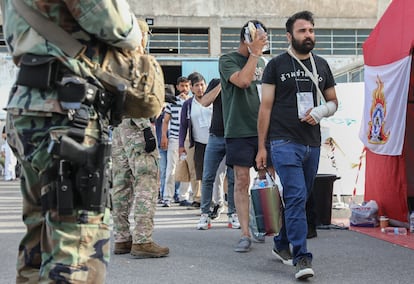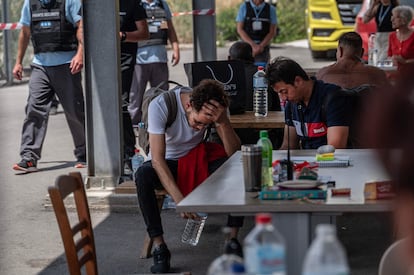Activists criticize arrest of nine survivors of Greek shipwreck: ‘The real traffickers do not risk their lives on boats like this one’
The Greek Coast Guard faces criticism from human rights organizations and lawyers, who are preparing a complaint for the alleged crimes of omission of assistance and reckless homicide


Two buses arrived on Friday at the port of Kalamata in southern Greece. The survivors of the sinking of a fishing boat full of migrants that sank in the early hours of Wednesday off the Greek coast were waiting there. The tragedy — in which at least 78 people died and that has left hundreds missing, including many women and children — is already one of the worst maritime disasters in the recent history of migration in the Mediterranean region. The group of just over 100 men who were rescued were in better spirits than the day before. They were a little more rested and ready to face the next step of their journey in search of a new life in Europe: the Malakasa refugee camp, 50 kilometers (31 miles) from Athens, where their asylum applications will be processed, and their fates decided.
But the two buses did not transport all the 104 rescued men to Malakasa: nine of them remained in Kalamata. They have been accused of forming a criminal organization to facilitate illegal immigration and of causing a shipwreck that endangered the lives of the passengers. Eight of them were transferred Thursday night to the cells of the Kalamata courts, while one remains in hospital under police guard, the Greek state news agency Amna reported.
Commander Sotiris Tsoulos confirmed to this newspaper that the detainees are in Coast Guard custody and will not be transferred to the Hellenic Police until they testify before the Prosecutor’s Office. As EL PAÍS was able to learn, their names are: Mohammad A. M., Marzuk L., Abdullah A., Kemal A. S. A., Suaad H. M., Ahmad A., Ahmed A., Islam M., and Mohammed A. They are all Egyptian nationals aged between 20 and 40.
One of the court-appointed lawyers assigned to the detainees — who preferred not to give his name because the proceedings are still subject to the secrecy of summary proceedings — said he was confident the charges against his client would be dropped. “The evidence is so weak that no other decision could be explained,” he said. The lawyer revealed that, unlike the rest of the migrants, the nine Egyptians have not yet been allowed to start the procedures to apply for asylum, nor have they undergone any medical examination in custody. The legal representatives for the nine defendants have agreed to coordinate in order to exchange information.
Those convicted of piloting boats carrying migrants already make up the second-largest group in the Greek prison system, second only to those sentenced for drug-related crimes, according to the NGO Aegean Migrant Solidarity-Community Peacemaker Teams, which monitors trials of this type. Christina Karvouni, spokesperson for the organization, denounces that most trials involving migrants are conducted without interpreters, suffer from serious procedural deficiencies, and often take place in the absence of conclusive evidence. “According to the testimony of survivors, the real traffickers do not risk their lives by boarding boats like this one. At most they pilot it at the start, but then they abandon it to reach safety.”
For Karvouni, another controversial issue is that the Greek Penal Code does not require the motive of profit or association with a criminal organization in the crime of human trafficking. As such, people who pilot migrant boats with the sole intention of reaching Europe to seek asylum can be sentenced with the same severity as those who are involved in transnational criminal networks. In the case of the nine detainees in Kalamata, Karvouni questions the way in which the coastguards picked them out among the group of migrants rescued from the sea, “without a process of identification that provides guarantees.” And she adds: “We know of other cases in which migrants have been mistaken for crew because they volunteered to help in the rescue efforts.”

Human rights associations and several legal organizations have announced that they are preparing a complaint against the Greek Coast Guard. They consider that the Coast Guard’s actions could constitute crimes of omission of assistance and reckless homicide, among others. Activists and lawyers are trying to gather testimony from survivors to support the charges. A team from the Kalamata Bar Association planned to go to the city hospital to inform inpatients about asylum procedures and their right to file a complaint against those responsible for the deaths of their relatives. “The lawyers of the city of Kalamata stand by all these people who are living through this tragedy,” the counsels said in a statement.
Ahmed Attia, a spokesman for the Egyptian community in Greece who traveled to Kalamata to help identify his missing compatriots, favors imposing severe penalties on smugglers who organize the trips and who “convince young people through trickery” to embark on dangerous journeys to reach Europe. “Let them rot in jail,” added Attia who, however, expressed his doubts that in this case the nine detainees are actually those responsible for organizing the journey.
Although the relocation of the survivors has diverted attention to the Athens region, dozens of relatives continue to arrive in Kalamata in the hope of finding their family members on the list of survivors. Tarek El-Zorkani, an Egyptian, received a stream of messages while waiting at the gates of the Kalamata Port Authority, which coordinates the bureaucracy related to missing persons. El-Zorkani, who is a resident of Greece, explained that from his hometown alone, 75 people are missing. Attia’s organization has counted 171 Egyptians among the passengers on the fishing boat. Most of them are not included in the official list: all indications are that they are among the deceased.
Sign up for our weekly newsletter to get more English-language news coverage from EL PAÍS USA Edition
Tu suscripción se está usando en otro dispositivo
¿Quieres añadir otro usuario a tu suscripción?
Si continúas leyendo en este dispositivo, no se podrá leer en el otro.
FlechaTu suscripción se está usando en otro dispositivo y solo puedes acceder a EL PAÍS desde un dispositivo a la vez.
Si quieres compartir tu cuenta, cambia tu suscripción a la modalidad Premium, así podrás añadir otro usuario. Cada uno accederá con su propia cuenta de email, lo que os permitirá personalizar vuestra experiencia en EL PAÍS.
¿Tienes una suscripción de empresa? Accede aquí para contratar más cuentas.
En el caso de no saber quién está usando tu cuenta, te recomendamos cambiar tu contraseña aquí.
Si decides continuar compartiendo tu cuenta, este mensaje se mostrará en tu dispositivo y en el de la otra persona que está usando tu cuenta de forma indefinida, afectando a tu experiencia de lectura. Puedes consultar aquí los términos y condiciones de la suscripción digital.








































